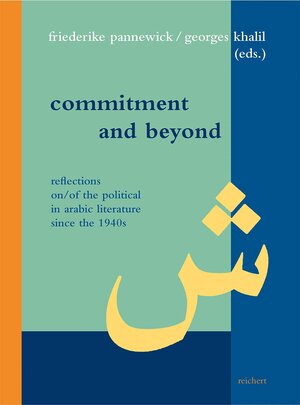
„Since 2011, ’the political’ has (again) become ubiquitous in all forms of Arab culture. At the same time many critics have questioned the role of writers and intellectuals. Did they play a role in stoking the popular uprisings? If not, and literature had indeed become somehwat disconnected from social change, what is its relevance? [...] Frederike Pannewick, Georges Khalil and Yvonne Albers’ timely volume approaches these questions through a sustained discussion of the term iltizam (engagement). Building on the pioneering work of Verena Klemm, the book presents twenty-two essays that track literary commitment from the 1940s to the present day. The authors represent a German-Arab network of literary scholars whose research has been developed concomitantly over decades. [The book] opens onto sociological questions of historical memory and the role literature might play in working through collective experiences, making [it] relevant beyond the field of literary studies. [...]
The first section of the book, “Of poetics and Politics: Revolution and Literary Commitment,“ starts in the present with three articles on the Egyptian revolution of 2011. [...] The volume’s second section, “Roots of a Discourse: Historical Concepts of Literary Commitment,“ focuses on the watershed year of 1967. [...] The books third section, “Refiguring iltizam: Literary Commitment after 1967,“ focuses on what became of commitment in a literature that is sometimes interpreted as uncommited and de-politicized. [...] [The book] presents a number of fresh analytical angles and new, previously undiscussed, authors, espacially in the fourth and final section of the book, “Commitment or Dissent? Contemporary Perspectives.“ Here, the volume returns to the present with seven articles on literary and artistic works produced since the 1990s. They probe globalization, cultural disorientation, the impact of new social movements and political questions after the financial crisis, and the fragmentation of literaty forms in the age of social media. [...]
The most exciting aspect of Commitment and Beyond is its ambitious attempt to connect contemporary changes in artistic production - confusing and multi-facetted as they may be - to the history of the 20th century, pushing other disciplines in Middle East studies to consider how historical events and figures are continuously reinterpreted.“
Von: Sune Haugbolle (Roskilde University)
In: Journal of Arabic Literature 48, (2017), S. 205-209.
Commitment and Beyond
Reflections on/of the Political in Arabic Literature since the 1940s
mit Yvonne Albers, herausgegeben von Friederike Pannewick und Georges KhalilThis book is about the relations between literature, society and politics in the Arab world. It is an attempt to come to terms with the changing conceptualizations of the political in Arabic literature (and to a certain extent theater and the visual arts) in recent modern history. It examines historical and contemporary conceptions of literary commitment (iltizām) and how notions of ‘writing with a cause’ have been shaped, contested, re-actualized since the 1940s until today.
Starting with the present day, it looks at literary practices during the ‘Arab Spring,’ then tracks back to the beginnings of literary politicization during the 1940s and 1950s, subsequently crosses the historical caesura of the late 1960s to consider competing re-conceptualizations of literary engagement in the 1970s and 1980s, before finally returning to the 1990s through to 2011. The chapters reexamine critically both current and historical notions of the political in modern Arabic literature as well as the legacy of iltizām as a term and an agenda. They discuss literary commitment not solely as a (completed) period in Arabic literary history but also as a vivid, changing and continuing idea that questions the role of literature and the author in and for a society.
Even though a number of seminal research volumes have been published on the conceptual history of Arab literary engagement in English language, there remain no book-length studies on the ongoing relationship between the literary and the political from the 1940s until today. Therefore, what makes this volume unique and outstanding is, firstly, its point of departure in approaching the question of the ‘new political’ in Arabic literature through an interrogation of iltizām’s longevity as both a historically adaptable and adaptive literary concept—something which the ‘Arab Spring’ has forcefully brought back to our minds. Secondly, this volume brings together the attempts, propositions, and research results of both established and upcoming scholars in the field of modern Arab literary and cultural history, all of whom have initiated and undertaken exceptional contributions regarding the issue. As such, this book fills a gap in the field of Arabic Literary Studies as it explicitly reconsiders the legacy of Arab literary commitment and its manifold and heterogeneous conceptions in the light of recent and present day developments.








